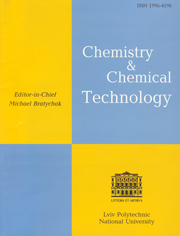Effect of Borate Groups on the Properties of Rigid Polyurethane Foams Obtained with Using Hydroxypropyl Derivatives of Urea
| Attachment | Size |
|---|---|
| 152.54 KB |
Keywords:
[1] Czuprynski B., Liszkowska J. and Paciorek-Sadowska J.: Polimery, 2004, 49, 187.
https://doi.org/10.14314/polimery.2004.187
[2] Paciorek-Sadowska J., Czuprynski B. and Liszowska J.: Chemik, 2012, 4, 297.
[3] Grand A. and Wilkie C.: Fire Retardancy of Polymeric Materials. Marcel Dekker, New York 2000.
[4] Kicko-Walczak E.: Polimery, 2008, 53, 126.
https://doi.org/10.14314/polimery.2008.126
[5] Kicko-Walczak E. and Jankowski P.: Polimery, 2004, 49, 747.
https://doi.org/10.14314/polimery.2004.747
[6] Alonso M., Auad M. and Nutt S.: Composites A, 2006, 37, 1952.
https://doi.org/10.1016/j.compositesa.2005.12.011
[7] Rivera-Armenta J., Heinze Th. and Mendoza-Martinez A.: Europ. Polym. J., 2004, 40, 2803.
https://doi.org/10.1016/j.eurpolymj.2004.07.015
[9] Paciorek-Sadowska J. and Czuprynski B: J. Appl. Polym. Sci., 2006, 102, 5918.
https://doi.org/10.1002/app.25093
[10] Czuprynski B., Paciorek-Sadowska J. and Liszkowska J.: Polimery, 2002, 47, 727.
https://doi.org/10.14314/polimery.2002.727
[11] Zarzyka-Niemiec I. and Narog D.: Przemysł Chemiczny, 2008, 87, 1048.
[12] Kucharski M. and Kijowska D.: J. Appl. Polym. Sci., 2003, 89, 104.
https://doi.org/10.1002/app.12065
[13] Polish (European) Standards: PN-EN ISO 845.
[14] Polish (European) Standards: PN-EN ISO 2796.
[15] Polish (European) Standards: PN-93C/89071, ISO 884:1978.
[16] PN ISO 4589-2:1999.
[17] Betes S. and Salomon P.: J. Fire Sci., 1993, 11, 271.
https://doi.org/10.1177/073490419301100306
[18] Baranowski W. and Koszkul J.: Przeglad Budowlany, 2006, 11, 25.










